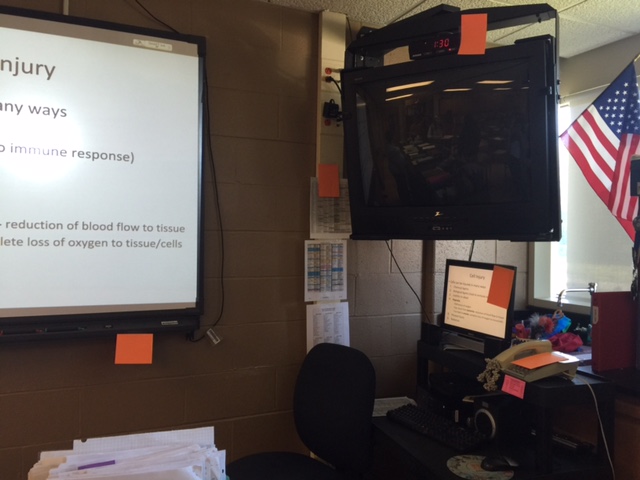Technology bond proposal education process continues for Nov. 3 election
September 26, 2015
On Nov. 3, registered voters residing in the Rochester Community School district will have an opportunity to vote on whether or not to approve a technology bond proposal that will fund renovations and construction in the schools.
A Technology and Infrastructure 2020 Committee, made up of more than 50 citizens and school district staff, was formed with the purpose of conducting a review of RCS’s infrastructure, including facilities, technology, student safety and security. The committee’s report was then reviewed by the Board of Education who simplified it to address the school district’s most urgent needs.
Science teacher and committee member Mrs. Sara Rosell discussed the process that the Technology and Infrastructure 2020 Committee underwent in order to devise the review.
“We met once a month for seven or eight times, and basically we looked at different areas in different schools,” Mrs. Rosell said. “Every school we went to, we did a tour of the technology and the facility in the school and we looked at various areas. We looked at what are the needs of the technology? What are the needs of the furniture? Each week was a different category that we talked about.”
Community Relations Director Lori Grein also expanded on other factors that were taken into consideration in terms of what would be included in the bond proposal. Citizens’ judgements on what they considered a crucial matter was acknowledged on top of the observations made by the committee.
“TI2020 committee saw presentations, toured district buildings,” Mrs. Grein said. “[They] participated in thinking activities, listened to input from students, read articles and shared in discussions to help shape their guiding viewpoints.”
Mrs. Grein also addressed the biggest concerns the public seems to have in terms of where the money to fund the construction and improvement costs would come from.
“If voters approve the bond proposal request, there will be no increase in the current tax rate,” Mrs. Grein said. “The current tax rate will be extended for five years. After five years, the tax rate is projected to decrease as we pay off the debt.”
Others have also expressed interest in how the bond proposal would interfere with the existing bond millage.
“In the simplest of terms, we are essentially replacing one old debt that is decreasing, for a new debt, and gaining $185 million to be used to enhance every school and school facility,” Mrs. Grein said.
The bond proposal is a continuation of the school district’s strategic plan to improve school interiors and other facilities. Permanent spaces for pre-kindergarten, adult and special education will also be established, and playgrounds, school sites, athletic facilities and fine arts facilities will see an improvement if the bond proposal is approved. Critical needs in roofs, doors, windows and electrical and mechanical areas, boilers, plumbing and asphalt maintenance will also be addressed in the bond proposal. School buses which are thought to be worn out after 10-12 years will be replaced if the bond is approved, and will be systematically upgraded. In order to raise awareness about the bond proposal, teachers placed orange tags on all the objects within their classrooms that will be touched with bond money if it passes.
According to Mrs. Grein, the money from the bond proposal will assure that all entrances to the schools are safe and secure. Because the bond proposal has been consistently referred to as the technology, it’s no surprise that upgrades in the technology, including computers, printers and even higher level technology courses will incorporated in the bond.
Mrs. Rosell spoke about some renovations that will occur if the bond proposal is approved that are something the public thinks about often.
“It’s easy to see the external things … like, we have broken desks that’ll get fixed,” Mrs. Rosell said. “But there’s a lot of underground and background things that are going to get fixed that you don’t regularly see. The wireless network is gonna get expanded, the bandwidth. The data storage downtown is 98 percent full, so [it covers] all the stuff we don’t see.”
Mrs. Rosell explained why there were some things that were not included in the bond proposal, like books.
“There are other things that aren’t part of the 185 million dollars [total],” Mrs. Rosell said. “The plan that we made was a ten year plan and so the bond is only a five year bond. The idea is that potentially, there could be a future opportunity to get those extra things finished up that aren’t part of that five years.”
Mrs. Grein further emphasized that when it came to deciding what was included in the bond proposal, it all came down to what was more urgent.
“The TI2020 committee identified $236 million in the original needs assessment to be accomplished over a 10-year period,” Mrs. Grein said. “As a good steward of the taxpayer’s dollar, the District reviewed the report details and conscientiously streamlined it to $185 million to address the most important, or urgent, needs over the next five years.”
However, the bond proposal will not address class sizes or employee salaries.
“Bond revenue cannot be used to pay employee salaries or benefits,” Grein said. “The revenue must be used for the purposes specified in the bond proposal and must be independently audited.”
Mrs. Rosell spoke out about how the money would then be distributed within the district if the bond were to pass.
“The money will be divided equitably based on the needs of the building,” Mrs. Rosell said. “Some buildings have higher needs than other buildings based on age and what needs to be replaced. That’s the plan, so it’s not evenly divided but it would be equitably divided.”
Endorsements for the bond proposal have been received by House Democratic Leader Tim Griemel, State Representative Michael Webber, Rochester Hills Mayor Bryan Barnett, Rochester Mayor Jeff Cuthbertson, Oakland Township Supervisor Terry Gonser, Ravi Yalamanchi, the Rochester Regional Chamber of Commerce, and the Rochester Community Schools PTA Council, according to Director of Community Relations and Foundation Lori Grein.
Still, there are other matters associated with the bond proposal that have people thinking about how to vote.
“One of the biggest concerns people have is making sure the money is spent on what they say it will be spent on,” Mrs. Rosell said. “Also. the fact that it hasn’t been laid out exactly what the money is going to be spent on, so I think some people are going to be kind of leery on what it’s spent on. But I think some people are gonna be okay. We’ll have to wait and see.”
The Board of Education has explicitly stated that the public does not need to worry about the money from the bond proposal going to schools in other districts.
“The bond proposal will affect every student at every grade level in every Rochester school. All revenue generated by the bond proposal will stay in Rochester,” Mrs. Grein said. “None of the revenue will be sent to Lansing or to any other school district. The short-term, zero increase extension of the tax rate will have long-range benefits for the school district.”
A list of Frequently Asked Questions about the bond proposal is updated on the school website, but for those who have other questions about the bond proposal can get in touch with a member of the Board.
“Students, parents and community members have embraced the new ‘Talk to us’ feature on our website to ask questions or offer input,” Mrs. Grein said. “Our goal is to respond to all individuals who provide contact information within 24 hours. It is not uncommon for community members to get a phone call directly from the Superintendent in response to their questions or concerns.”
Questions about when the effects will take place have risen. Mrs. Rosell spoke about her hopes in terms of instantaneous the effects of the bond proposal would be if it was approved.
“Probably within the first year, you’d see a small change,” Mrs. Rosell said. “ I’m not sure exactly what their timeline is on when exactly things are gonna be done, but I’m sure they have plans for the first year and then the second year and so on. Hopefully, it would be immediate.”
Mrs. Grein further explained on when the improvements can be expected.
“If the bond proposal is approved by voters on November 3, the projects will be spaced over a five-year period,” Mrs. Grein said.
Renovations and improvements are more on an individual school basis, and those attending a school in the district may have questions on who would be involved in the upgrades if the bond is approved. Technology Facilitator Mrs. Karen Carl, explained how she would be involved in the technological process if the bond is approved.
“There are going to be a lot of decisions to make on exactly what kind of equipment we want to use and what we want to buy,” Mrs. Carl said. “Mr. DeLuca has already asked me if I would help him out with that, and helping him research the different products available and what’s available today. We might have something different available in a few months when the bond passes.”
Aside from being a technological facilitator for Rochester High School, Mrs. Carl is also a parent and has expressed her stance on the bond proposal. She currently resides within the RCS district, and has a child attending a school in the district.
“It’s going to affect every single kid in this district because every kid will be touched with this bond,” Mrs. Carl said. “We’re trying to balance the whole have and have not situation and we’re really trying to make it so that every kid is experiencing the same kinds of things. I think it’s an amazing opportunity.”








